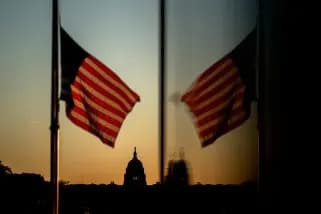American Revolution, a six-part, 12-hour PBS series by Ken Burns, Sarah Botstein and David Schmidt, premiered after a six-month tour to 32 cities. Built over a decade with a budget exceeding $30 million, the film recreates 18th-century geography and scenes using maps, reenactors and original location footage. It expands the Revolutionary narrative to include Indigenous people, enslaved and free Black Americans, foreign allies and nearly 150 historical figures voiced by 61 actors. The series emphasizes coalition-building, the messy origins of republican ideals, and the global influence of 1776.
Can Ken Burns Reignite American Patriotism? Inside the Ambitious PBS Series 'American Revolution'
Can Ken Burns Reignite American Patriotism?
Ken Burns, joined by co-producers Sarah Botstein and David Schmidt, spent the past year on an extensive publicity tour promoting American Revolution, a six-part, 12-hour series that premiered on PBS. Across a six-month tour of 32 cities in 17 states, the filmmakers delivered a consistently nonpartisan, hopeful message: studying the nation’s origin story can renew civic understanding even in divisive times.
Reaching a Wide Audience
The team has appeared on a broad range of platforms—from podcast stages such as Theo Von and Joe Rogan to network interviews with MSNBC and The New York Times—seeking to engage viewers across the political spectrum. “We’re trying to reach as many people as we can,” Schmidt told Military Times. Burns echoed that outreach at a Mount Vernon panel on Oct. 29, noting how historical perspective can provide reassurance about the present.
“You can have at least the possible reassurance that things were really divided back then. It was a civil war. Examining the origin story provides you with a kind of renewal and a fresh understanding.” — Ken Burns
How the Film Was Made
The project grew out of a spontaneous idea in 2015 and became a decade-long effort with a production budget north of $30 million. Without the benefit of contemporary photographs or archival film, Burns and his collaborators leaned on creative solutions: commissioned watercolors, detailed historical maps, diaries, reenactors, and original footage shot at nearly 100 historic locations across the original 13 colonies, plus sites in London and the English countryside.
Schmidt described painstaking work to recreate 18th-century geography, even altering modern waterways in maps to reflect the period. Those constraints, he added, sparked imaginative storytelling rather than limiting it.
Scope, Cast and Storytelling
The six-part series expands beyond well-known founders to follow nearly 150 historical figures, read by 61 voice actors including Tom Hanks, Meryl Streep, Morgan Freeman, Jeff Daniels, and Kenneth Branagh. Militarily, the film dramatizes 36 engagements—from Bunker Hill and Yorktown to lesser-known clashes—while emphasizing logistics, strategy and the coalition-building that shaped victory.
Broader Themes: Citizenship, Coalition and Contradiction
Burns and his team explore how the Revolution evolved from limited war aims—liberating Boston, seeking redress—to a transformative project that produced the notions of citizenship and civilian government. Schmidt noted that ideals such as nonpartisan republicanism were often outcomes of the war rather than initial objectives. Winning required building broad domestic coalitions and securing foreign allies: the French, Spanish allies of the French, and the Dutch all played roles that turned a colonial rebellion into an international conflict.
The series also foregrounds voices long omitted from traditional narratives: Indigenous peoples, enslaved and free African Americans, Loyalists, German troops fighting for Britain, and civilians across North America and the Caribbean. Burns does not shy away from complexity—particularly in his treatment of George Washington, praising his leadership while acknowledging tactical errors and the moral contradiction of enslaving hundreds of people.
“He’s our guy, and that’s pretty amazing. Look, we do not soft pedal the flaws... You can’t square that circle. But we are so lucky [to have had him], and we’re here because of him.” — Ken Burns
Legacy and Global Reach
Beyond battles and biographies, the documentary charts how revolutionary ideas spread globally— inspiring movements and leaders centuries later. Schmidt cites Ho Chi Minh referencing Thomas Jefferson when declaring Vietnamese independence as an example of the Revolution’s far-reaching influence.
Bursting with research, cinematic reconstruction and a diverse cast of voices, American Revolution aims to "reboot" familiar stories—supplementing what audiences already know and offering deeper context to help citizens better understand their history and civic identity. Burns closed a Mount Vernon panel with a Hessian soldier’s reflection: "Who would have thought 100 years ago that out of this multitude of rabble would arise a people who could defy kings?" That, Burns said, captures the series’ essence: the right to defy kings.
Help us improve.


































